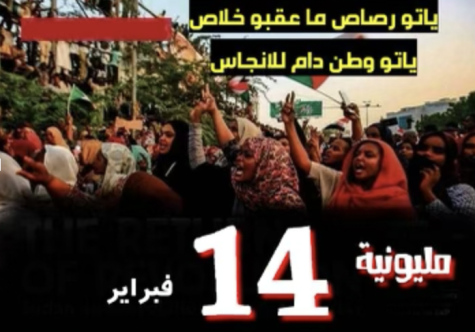Sudan Fights Back: The Sudanese Peoples’ Fight for Democracy
November 21, 2022
July 5, 2019, Khartoum, Sudan: The Transitional Military Council (TMC) and the Forces of Freedom and Change (FFC) sign a revolutionary agreement that ushers in a new age of democracy in Sudan. Under Omar al-Bashir, the previous dictator who seized power in 1989, Sudan had been ravaged by massacres, rampant militias, and poverty, particularly in the Darfur region, where al-Bashir’s hired militia, the Janjaweed, committed innumerable atrocities.
The promise of a transition into democracy brought hope to the people of Sudan. I remember an electric feeling in my household when the news broke, my mother excitedly gushing about the possibility of democracy in her country for the first time since she was a teenager to anyone who would listen. For nearly two years, things looked promising. Then, on October 25, 2021, the Sudanese military placed Prime Minister Abdullah Hamdok on house arrest and took power through a military coup. After protests broke out across the country, particularly concentrated in the capital city of Khartoum, Hamdok was reinstated, but signed a deal of joint power with the military. The Sudanese people refused to accept more military domination and took to the streets.
The valiant citizens of Khartoum march through the city, chanting “A’shaab shaabi aghwa. Aredda mustahila.” The people are strong, there is no going back. The military disabled the internet and mobile communication across the country in an attempt to destabilize the movement, but the protests continue because of the grassroots nature of its organization. Citizens have been on the streets tirelessly nearly every day since the coup. Political groups of all different ideologies are banding together against the threat of a new regime, and one thing is clear: Sudan will not settle for anything less than democracy.
As for international intervention, the United States has condemned the actions of the Sudanese military, suspending 700 million dollars in aid and looking to its allies for similar reactions. The African Union has suspended Sudan, and the United Nations Human Rights Council condemned the military and is currently investigating the human rights abuse being perpetrated against the people. The hope is that with the already devastated economic conditions, exacerbated by the COVID-19 pandemic, the military coup will have no choice than to comply with the wishes of the international community for the sake of the Sudanese economy.
The Janjaweed, the militia responsible for the terror in Darfur, was converted by Sudanese intelligence authorities into the “Rapid Support Forces” for the military junta, led by Hamdan “Hemeti” Dagalo. The RSF are a paramilitary force designed to crush rebellion in Darfur, and have since been known to perpetrate brutal human rights abuses and military oppression against the Sudanese people. At least 75 civilians have been killed since October, and hundreds more have been injured. There have been reports of civilians blockading streets to defend against military tanks and equipment, and shocking video footage of protestors being attacked with tear gas. Soldiers and police have been seen firing live ammunition into crowds, even using snipers to target the younger, more active members of the movement.
52 of Sudan’s 65 years of independence from British rule have been under a military regime, according to Chatham House. Inshallah, hopefully, this will be the beginning of a new period of freedom and peace.






























